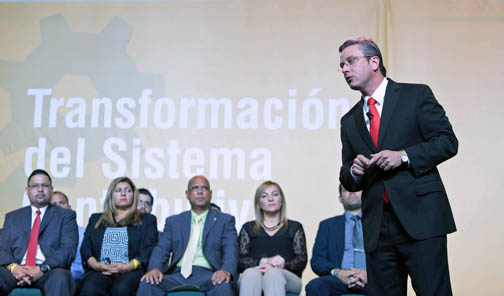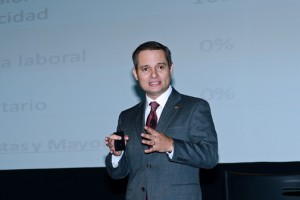Gov. talks Treasury overhaul, submits tax reform bill


Gov. García-Padilla spent the better part of his morning meeting with different interest groups, mostly from the private sector at the Puerto Rico Convention Center.
Gov. Alejandro García-Padilla announced Wednesday the restructuring of the Puerto Rico Treasury Department, as well as offered details of the administration’s proposed tax reform expounded in a 1,400-page bill submitted at the Legislature late in the day.
The governor spent the better part of his morning meeting with different interest groups, mostly from the private sector, to offer details of his plan to transform the tax system, in an attempt to show them how they will benefit.
“This proposal aims to put more money into the pockets of those who work and promote entrepreneurship. We are moving toward economic recovery and this legislation will provide mechanisms to spur our economic development and quality of life of Puerto Ricans,” said the governor during his presentation at the Puerto Rico Convention Center.
According to the proposal, corporations could become conduit entities through which revenue would flow. Small and medium-sized businesses would file taxes as individuals, paying the rates that apply to them. The reform would also be eliminating the “Patente Nacional” surcharge, which would lower operating costs of doing business, he said.
Similarly, the governor explained that the way the system currently works, businesses pay a sales and use tax, while with a value-added tax system, businesses could claim a credit for their purchases and services.
During the meeting, he also said small businesses would be exempt from the VAT, so that companies with less than $75,000 in sales would not have to register with Treasury for the purposes of this tax.
Moreover, García-Padilla said system’s proposed transformation, directed toward consumption, will combat tax evasion and help capture the informal economy.
At present, 85 percent of income tax returns are filed by salaried workers and less than 10 percent of taxpayers pay about 78 percent of income taxes, he said. Furthermore, recent studies confirmed that Puerto Rico’s informal economy is approximately $20 billion.
“The measure proposes greater emphasis on productivity with a reduction in tax rates for individuals and corporations. More than 80 percent of taxpayers pay no income tax,” he said. “The incomes below $40,000 for individuals or $80,000 in the case of married couples, would be tax exempt. The rate for corporations is reduced by 25 percent; and it would eliminate the additional tax on individuals who are self-employed.”
Trade groups react
On Wednesday, two of the island’s major trade groups, the Puerto Rico Manufacturers Association and the Puerto Rico Marketing, Industry and Food Distribution Chamber (MIDA for its Spanish acronym), presented their views on the proposed tax reform.
PRMA President Carlos Rivera-Vélez said regardless of the tax system that is ultimately used, the government’s objective must be to present a “transparent, simple, effective and fair” tax reform that stimulates investment, fights tax evasion and avoids generating new problems for the public coffers.
“The government’s debt is the island’s debt. We can not continue mortgaging the future. We must tighten our belts, restructure, cut fat, reduce costs and work with a balanced budget,” he said. “It behooves us all, public sector and private sector to come together to get out of this emergency with novel formal and structured solutions that are bold enough to increase production and therefore jobs, while we restructure the debt.”
Furthermore, he said “we must act urgently and with aplomb to reorganize, rethink and restructure the government and corporations. The north should be simplification, agility, liquidity and cost control. By doing what we are doing now, we’re not going to achieve a much-needed radical change.”
Eliminating tax evasion, he said, must be a shared responsibility between the government and the private sector. At the same time, Rivera-Vélez said emphasizing on a consumption tax rather than taxing productivity is something that is well-received on an international level.
“Especially in economies with a large informal sector. The sales and use tax or the VAT are mechanisms for collections. What matters is that they are properly structured and their uptake is effective,” said Rivera-Vélez.
Meanwhile, MIDA said to be pleased Wednesday with the exclusion of non-prepared food from the new VAT and the elimination of the “National Patent.”
“The elimination of the National Patent and excluding prepared foods from the VAT represent a potential relief for our industry and for consumers,” said Manuel Alfonso Reyes, executive vice president of the entity.
“We have always argued that food can not be treated like any other consumer good because they are the only goods essential for life and health that have to be consumed several times a day,” he said. “Therefore, the undeniable regressive consumption taxes are better served by combining exemptions for basic necessities such as food and medicines, with credits and rebates to people with fewer resources as proposed by the governor.”
Meanwhile, MIDA President Ricky Castro said the group is on record saying that Puerto Rico’s tax system should reward work while imposing liability on evaders, “which is why we approve moving toward consumption taxes regardless of the name. In any case, this process must ensure economic development, by eliminating the tax on personal property and lowering income tax rates to all citizens or businesses.”















